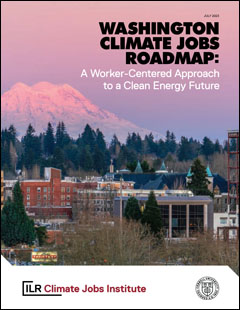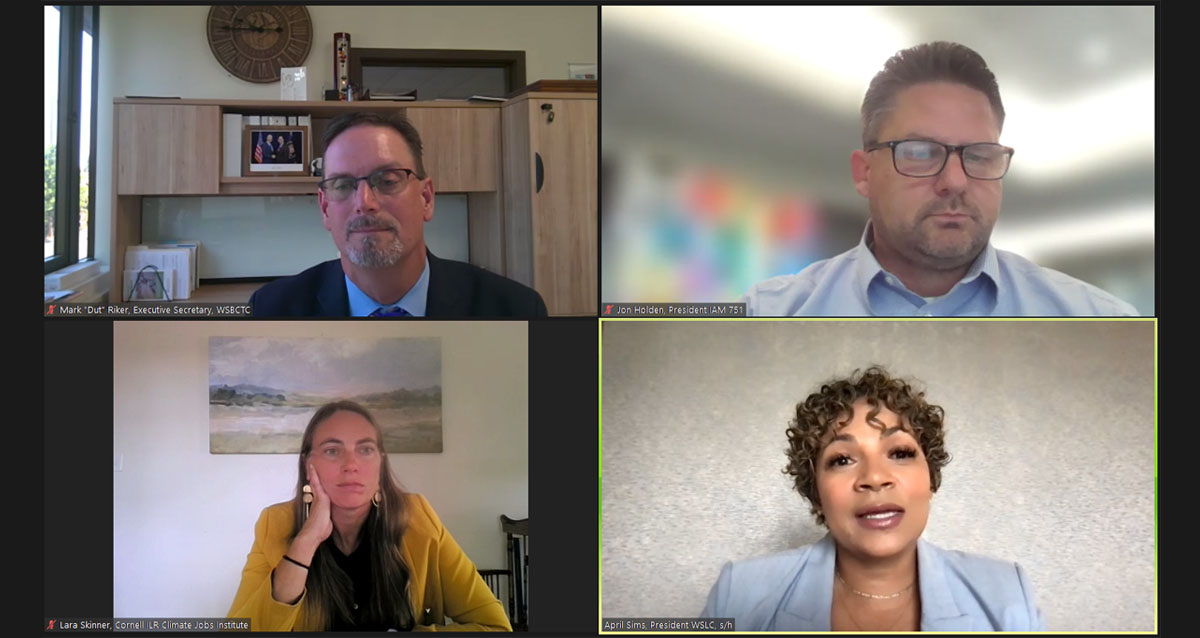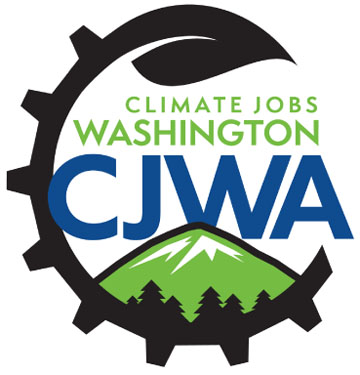STATE GOVERNMENT
Unions launch Climate Jobs Washington
Labor-led coalition releases comprehensive report from Cornell University with policy recommendations to advance equitable, pro-worker climate action in Washington
The following is from Climate Jobs Washington:
(July 31, 2023) — Today, unions across Washington launched Climate Jobs Washington, a new coalition of labor unions coming together to address both climate change and racial and economic inequality by creating high-quality union jobs to sustain Washington’s families and communities.
 The coalition also unveiled a comprehensive report, “A Climate Jobs Roadmap for Washington State,” authored by researchers at Cornell University’s Climate Jobs Institute, that outlines policy recommendations around which the coalition intends to campaign. Full implementation of a worker-centered climate roadmap can create over 800,000 jobs across the building, transportation, energy, low-carbon manufacturing, resilience, and adaptation sectors in Washington State. The state can thus chart a path forward that marries Washington’s climate, jobs, and equity goals.
The coalition also unveiled a comprehensive report, “A Climate Jobs Roadmap for Washington State,” authored by researchers at Cornell University’s Climate Jobs Institute, that outlines policy recommendations around which the coalition intends to campaign. Full implementation of a worker-centered climate roadmap can create over 800,000 jobs across the building, transportation, energy, low-carbon manufacturing, resilience, and adaptation sectors in Washington State. The state can thus chart a path forward that marries Washington’s climate, jobs, and equity goals.
“Washington must tackle the dual crises of climate chaos and inequality by expanding access to union climate careers for women, communities of color, and rural communities,” said Washington State Labor Council, AFL-CIO President April Sims. “By winning strong labor and equity standards for workers in the clean energy economy, we can create training pathways to good union careers that pay family-sustaining wages in communities that need them most.”
“From rising temperatures to worsening wildfires across the state, the climate crisis is having a direct impact on Washington’s communities, especially in communities of color and rural areas,” said Washington State Building and Construction Trades Council Executive Secretary Mark Riker. “That’s why labor unions have formed the Climate Jobs Washington coalition. We know we can build a strong clean energy economy that prioritizes the needs of workers and their families by leveraging the proven skills of our fossil fuel veteran workers to facilitate the transition to a clean energy economy.”
The report from Cornell University researchers lays out an ambitious, pro-worker climate policy roadmap to achieve four goals: quickly decarbonizing Washington’s economy; ensuring that the tens of thousands of new jobs that get created as part of Washington’s energy transition adhere to high labor standards in terms of pay, benefits, training, and job security; bringing underrepresented workers into the clean-energy workforce through well-run apprentice and pre-apprentice programs; and ensuring a just transition for workers and communities most affected by these changes.
Twenty effective ways to create high-quality climate jobs in Washington state:
- Commit to 100% in-state net-zero energy by 2045 and establish an inclusive, expedited siting process.
- Make Washington State a national leader in green hydrogen production.
- Make Washington State a national leader in the manufacturing and construction of small-scale, modular nuclear plants.
- Develop a 21st century electric system that prioritizes a highly skilled utility workforce, safety, affordability, and local manufacturing
- Position Washington State as a west coast offshore wind manufacturing center.
- Make Washington State a premier solar and wind refurbishing and recycling hub for the west.
- Reopen the Alcoa Intalco aluminum smelter and expedite the buildout of 400 megawatts of clean energy to support the plant.
- Make WA’s schools carbon-free and healthy by 2030.
- Make WA’s public buildings carbon-free and healthy by 2030.
- Equitably increase accessibility to low-carbon heating and cooling by 2030
- Expand public transit rail to increase ridership and address inequities.
- Commit to 100% electric school buses and EV public infrastructure buildout by 2030.
- Position Washington State as a national leader in sustainable aviation fuel production.
- Repair, expand, and modernize WA’s drinking water systems by 2030.
- Complete WA’s sidewalk systems using previous concrete to improve active mobility and groundwater recharge.
- Establish a public program to install cool roofs on 100% of buildings in the Tri-Cities area.
- Build a successful, equitable, clean energy economy in Washington state.
- Use climate investments to maximize high-quality manufacturing jobs.
- Amplify labor’s voice in climate and clean energy debates.
- Ensure WA’s workforce development programs retain and grow a diverse, inclusive, and highly skilled clean energy workforce.
The report also ties these climate solutions to recommendations for strengthening labor and equity standards for workers in Washington’s clean energy economy, including:
- Attaching prevailing wage and registered apprenticeship requirements to utility-scale or state-subsidized renewable energy projects;
- Expanding pathways into unionized renewable energy careers, through apprenticeship and pre-apprenticeship programs, for Washingtonians most affected by environmental injustice and economic inequality, including working class, rural, people of color and indigenous communities;
- Expanding and strengthening collective bargaining through project labor and community workforce agreements; and
- Planning and funding support for workers and communities most affected.

WSLC President April Sims speaks at the July 31 press conference announcing the creation of Climate Jobs Washington. Also participating were WSBCTC Executive Secretary Mark Riker, IAM District 751 President Jon Holden, and Lara Skinner of the Climate Jobs Institute at Cornell University.
Now is the time to go big on investing in clean energy. New federal incentives from the Inflation Reduction Act (IRA) could boost all types of clean energy, from solar and wind energy to green hydrogen. Many of these incentives are tied directly to strong labor standards that will make sure the workers on those projects are paid fairly and benefit from high-quality apprenticeship programs.
“Our research highlights what Washington workers already know to be true: climate breakdown is real, and it’s hitting workers and under-resourced communities first and worst. There is hope and it relies on labor. Our report outlines a science-based program for Washington that would reduce carbon emissions, transition the state to an equitable renewable energy economy, and create family-supporting union jobs in communities that need them most. This report is a bold first step towards a pro-worker clean energy transition that meets the scale of this crisis and addresses long-standing racial and economic inequality,” says Lara Skinner, Founding Executive Director of the Climate Jobs Institute at Cornell University.
“Building a sustainable aviation fuel industry with the recommendations from this report would put Washington over its goal of 30% SAF into Sea-Tac by 2030 and would create thousands of union jobs both in construction to build the infrastructure and ongoing, long-term operation of the facilities in our state,” said International Association of Machinists and Aerospace Workers District 751 President Jon Holden. “Additionally, Washington is a great location for offshore wind manufacturing, which would reduce pollution and provide sustainable, reliable local wind power for our homes. It will also drive the manufacturing of components and assemblies here, such as wind turbines, used within the industry, which should provide high-quality, union opportunities for our communities.”
 Climate Jobs Washington is a growing coalition of labor unions advocating for good union jobs while building a clean energy economy in Washington that benefits everyone. Learn more at climatesjobswa.org.
Climate Jobs Washington is a growing coalition of labor unions advocating for good union jobs while building a clean energy economy in Washington that benefits everyone. Learn more at climatesjobswa.org.





